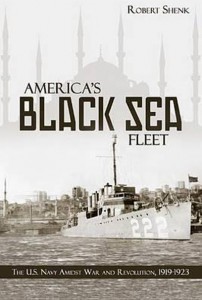I wrote the dust-jacket promotion blurb for this book where I suggested this book be considered for the CNO’s reading list – for good reasons – this book provides a historical account of the post-World War I history where revolutionary and nationalistic forces are rising to fill the voids left by the toppled Russian Monarchy and collapsed Ottoman Empire. Given recent events in the Middle East and the ongoing strife in Syria, there are situational parallels with the types of military operations other than war (MOOTW) that the U.S. Navy played in throughout its history. In addition, there are moral questions about the appropriateness of intervention in the protection of human rights.
A retired Navy Reserve captain and English professor at the University of New Orleans, Shenk covers the activities of a flotilla of combatants and auxiliaries, based out of Constantinople under the command of Rear Admiral Mark Bristol who was designated as the U.S. High Commissioner in the region to promote American interests. As Shenk points out, the U.S. was just one of several powers to have a military presence in the region. However, unlike the Europeans, the United States had not declared war against Turkey during World War I, and thus were not viewed as occupiers. That Greece was invited to provide ground forces to occupy areas of Western Turkey would only foster a rising Turkish nationalism, that Bristol correctly discerned, would lead to the emergence of the modern Turkish state.
Unfortunately, Shenk notes, the rise of Turkish nationalism came at the expense of all of the other nationalities who had resided in Asia Minor for centuries. Shenk goes into the very grim details about atrocities committed in different regions, culminating with the “Burning of Smyrna” in September 1922. While there were atrocities committed by all sides, Shenk’s account will not make this a book-of-the-month selection in Ankara.
The Russian Civil War and the success of the Red Army further complicated matters as a massive refugee challenge confronted the region. The Naval Institute’s February 2013 Naval History magazine offers a fine excerpt from this chapter that highlights the U.S. Navy’s role in the evacuation of thousands of Russian nationals from Black Sea Crimean ports.
This book, which I heartily endorsed, is not without shortcomings. Shenk’s portrayal of Bristol is not inspirational (nor should have it been). In nearly every case where he is confronted with reports of genocidal atrocities, Bristol reacts with non-committal indifference. While he is the on-scene commander with enormous authority, American foreign policy is initiated in Washington and Shenk provides little mention of President Wilson and no mention of President Harding. These events happened on their watch. More detail on deliberations within the Wilson and Harding administrations about U.S. policy in Asia Minor could have placed Bristol’s role in better context.
Dr. Winkler is the Director of Programs with the Naval Historical Foundation.



Craig